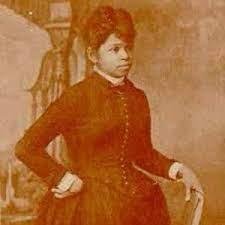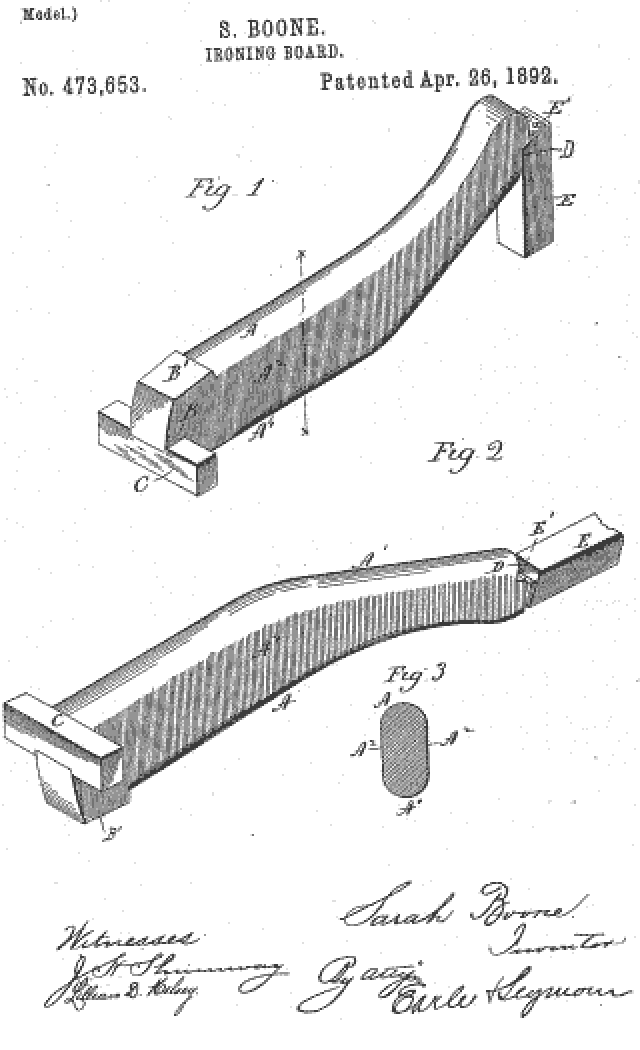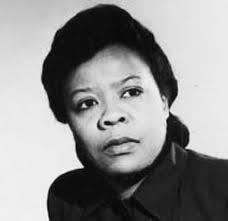Sarah Boone was an African American dressmaker who made her name by inventing the modern ironing board. In her patent application, she wrote that the purpose of her invention was `to produce a cheap, simple, convenient and highly effective device, particularly adapted to be used in ironing the sleeves and bodies of ladies garments. With its approval in 1892, Boone became one of the first African American women to be awarded a patent.
1832
1904
USA
African American
-1891- Boone applied for a patent for her new and improved ironing board
-1892- Boone received the U.S. Patent #473, 653
Boone was born enslaved in Craven County, North Carolina in 1832, as Sarah Marshall
After Boone’s escape from enslavement she migrated together with her husband, children and widowed mother to New Haven, Connecticut, prior to the Civil War. They settled into an African American neighbourhood near Dixwell Avenue, where Boone worked as a dressmaker and her husband as a bricklayer, until his death in the mid-1870s. According to records, Boone was successful enough to own her own house. Hailing from an area where it was illegal to teach African Americans to read and write, Boone finally took steps to overcome that disadvantage in her late 40s, possibly through her membership at the Dixwell Congregational Church.
Boone’s legacy however comes from her invention of the improved ironing board. The ironing board had first been patented in 1858 and circulated into common usage in the times that followed. Facing fierce competition, Boone had to find a way for her dresses to catch the eye of customers. By the early 1890s, she hit on something that was tailor-made for the corsets that were popular in the era. To that point, dressmakers were primarily ironing their clothes on a wooden plank placed across two chairs, a method that was fine for a wide skirt but ill-suited for the contours of tight, fitted material. Demonstrating the writing skills she had acquired only a few years earlier, Boone applied for a patent for her new and improved ironing board in 1891. Boone’s improvement was patented on 26 April 26, 1892, as U.S. Patent 473,653. The patent described the new invention as “particularly adapted to be used in ironing the sleeves and bodies of ladies’ garments.” It accomplished this by taking the previously rigid design of the board and curving the edges slightly, to account for the seams inlaid in most women’s clothing at the time. It was sized to that of the typical sleeve of contemporary clothes. The text of the patent hints at a possible variation that would be better suited for men’s clothing. The board also used a support system to flip the garment to its other side, enabling the user to iron both sides of a sleeve. This meant that the ironing of one side would not be undone by the ironing of the other side. Boone was among the first Black women in American history to receive a patent. Her patent, confirmed in 1892, came just eight years after that of Judy Reed, who is believed to be the first African American woman to receive a patent.
She married James Boone in 1847, who was also enslaved. Shortly after their marriage they were freed under unknown circumstances and moved to New Haven. James Boone worked as a bricklayer and the pair had eight children together.
https://www.Blackpast.org/african-american-history/boone-sarah-1832-1904/
https://www.biography.com/inventor/sarah-boone



